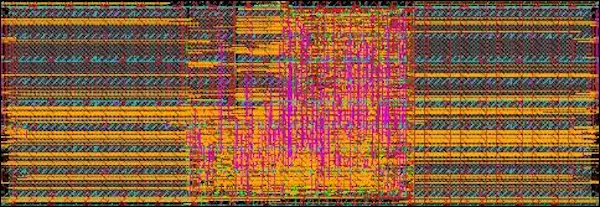(more info) |
|||
| Line 23: | Line 23: | ||
|l1d per=core | |l1d per=core | ||
}} | }} | ||
| − | '''Vanilla-5''' is a custom [[RISC-V]] core microarchitecture designed specifically for the {{\\|Celerity}} SoC. | + | '''Vanilla-5''' is a custom [[RISC-V]] core microarchitecture designed specifically for the {{\\|Celerity}} SoC. The work is a joint effort by the Bespoke Silicon Group at the University of Washington, Cornell University, University of Michigan, and UC San Diego. |
| + | |||
| + | == Overview == | ||
| + | Vanilla-5 is a custom-designed [[RISC-V]] core designed by the {{\\|Celerity}} SoC team for that chip. The core is a fully synthesized design that implements the {{riscv|extensions|RV32IM}} ISA (base as well as the integer and multiply extensions). Vanilla-5 was designed to take up very little silicon area. For that reason it uses an incredibly simple design - it's an [[in-order]], [[single-issue]], [[pipelined|5-stage]] design. Each core incorporates a 32-entry, 32b register file which is implemented using two 1R1W latch-based [[sram|memory]] as well as a 4 KiB of private [[level 1]] [[instruction cache]] and a private 4 KiB of private level 1 [[data cache]]. | ||
| + | |||
| + | The Vanilla-5 core is integrated into the {{\\|Celerity}} SoC where it's used as part of a [[manycore]] array of 496 tiles. Each tile comprises a Vanilla-5 core and a router. The core is silicon-proven capable of up to 1.4 GHz. | ||
| + | |||
| + | == Die == | ||
| + | * [[TSMC]] [[16 nm process]] | ||
| + | * 24,251 µm² (0.024 mm²) die area | ||
| + | |||
| + | |||
| + | :[[File:vanilla-5 core.png|600px]] | ||
| + | |||
| + | |||
| + | :[[File:vanilla-5 (annotated).png|600px]] | ||
| + | |||
| + | |||
| + | '''Routing:''' | ||
| + | |||
| + | :[[File:vanilla-5 routing.png|600px]] | ||
| + | |||
| + | === Breakdown === | ||
| + | {| class="wikitable" | ||
| + | ! Type !! Area (µm²) !! % | ||
| + | |- | ||
| + | | IMEM || 6691 || 27.59 | ||
| + | |- | ||
| + | | DMEM || 6691 || 27.59 | ||
| + | |- | ||
| + | | RF || 2008 || 8.28 | ||
| + | |- | ||
| + | | Core logic || 2473 || 10.20 | ||
| + | |- | ||
| + | | ALU || 485 || 2.00 | ||
| + | |- | ||
| + | | Div || 412 || 1.70 | ||
| + | |- | ||
| + | | Mult || 301 || 1.24 | ||
| + | |- | ||
| + | | Pipeline/other || 1275 || 5.26 | ||
| + | |- | ||
| + | | NoC || 1881 || 7.76 | ||
| + | |- | ||
| + | | Endpoint FIFO || 303 || 1.25 | ||
| + | |- | ||
| + | | Credit counter || 23 || 0.09 | ||
| + | |- | ||
| + | | Router || 1555 || 6.41 | ||
| + | |- | ||
| + | | Endcap/welltap || 281 || 1.16 | ||
| + | |- | ||
| + | | Filler || 1635 || 6.74 | ||
| + | |- | ||
| + | | Unutilized || 2591 || 10.68 | ||
| + | |- | ||
| + | | Total || 24251 || 100.00 | ||
| + | |} | ||
| + | |||
| + | == Source core == | ||
| + | The Vanilla-5 core is open source and can be found on https://bitbucket.org/taylor-bsg/bsg_manycore/src/master/v/vanilla_bean/ | ||
| + | |||
| + | == See also == | ||
| + | * {{\\|Celerity}} | ||
| + | |||
| + | == Bibliography == | ||
| + | * {{bib|vlsi|2019}} | ||
| + | * {{bib|hc|29}} | ||
Revision as of 01:03, 13 January 2020
| Edit Values | |
| Vanilla-5 µarch | |
| General Info | |
| Arch Type | CPU |
| Designer | University of Michigan, University of California, Cornell University, University of California |
| Manufacturer | TSMC |
| Process | 16 nm |
| Pipeline | |
| Type | Pipelined |
| OoOE | No |
| Speculative | No |
| Reg Renaming | No |
| Stages | 5 |
| Decode | 1 |
| Instructions | |
| ISA | RISC-V |
| Extensions | Integer, Multiply |
| Cache | |
| L1I Cache | 4 KiB/core |
| L1D Cache | 4 KiB/core |
Vanilla-5 is a custom RISC-V core microarchitecture designed specifically for the Celerity SoC. The work is a joint effort by the Bespoke Silicon Group at the University of Washington, Cornell University, University of Michigan, and UC San Diego.
Overview
Vanilla-5 is a custom-designed RISC-V core designed by the Celerity SoC team for that chip. The core is a fully synthesized design that implements the RV32IM ISA (base as well as the integer and multiply extensions). Vanilla-5 was designed to take up very little silicon area. For that reason it uses an incredibly simple design - it's an in-order, single-issue, 5-stage design. Each core incorporates a 32-entry, 32b register file which is implemented using two 1R1W latch-based memory as well as a 4 KiB of private level 1 instruction cache and a private 4 KiB of private level 1 data cache.
The Vanilla-5 core is integrated into the Celerity SoC where it's used as part of a manycore array of 496 tiles. Each tile comprises a Vanilla-5 core and a router. The core is silicon-proven capable of up to 1.4 GHz.
Die
- TSMC 16 nm process
- 24,251 µm² (0.024 mm²) die area
Routing:
Breakdown
| Type | Area (µm²) | % |
|---|---|---|
| IMEM | 6691 | 27.59 |
| DMEM | 6691 | 27.59 |
| RF | 2008 | 8.28 |
| Core logic | 2473 | 10.20 |
| ALU | 485 | 2.00 |
| Div | 412 | 1.70 |
| Mult | 301 | 1.24 |
| Pipeline/other | 1275 | 5.26 |
| NoC | 1881 | 7.76 |
| Endpoint FIFO | 303 | 1.25 |
| Credit counter | 23 | 0.09 |
| Router | 1555 | 6.41 |
| Endcap/welltap | 281 | 1.16 |
| Filler | 1635 | 6.74 |
| Unutilized | 2591 | 10.68 |
| Total | 24251 | 100.00 |
Source core
The Vanilla-5 core is open source and can be found on https://bitbucket.org/taylor-bsg/bsg_manycore/src/master/v/vanilla_bean/
See also
Bibliography
- 2019 Symposia on VLSI Technology and Circuits (VLSI 2019).
- IEEE Hot Chips 29 Symposium (HCS) 2017.
| codename | Vanilla-5 + |
| designer | University of Michigan +, University of California + and Cornell University + |
| full page name | umich/microarchitectures/vanilla-5 + |
| instance of | microarchitecture + |
| instruction set architecture | RISC-V + |
| manufacturer | TSMC + |
| microarchitecture type | CPU + |
| name | Vanilla-5 + |
| pipeline stages | 5 + |
| process | 16 nm (0.016 μm, 1.6e-5 mm) + |


